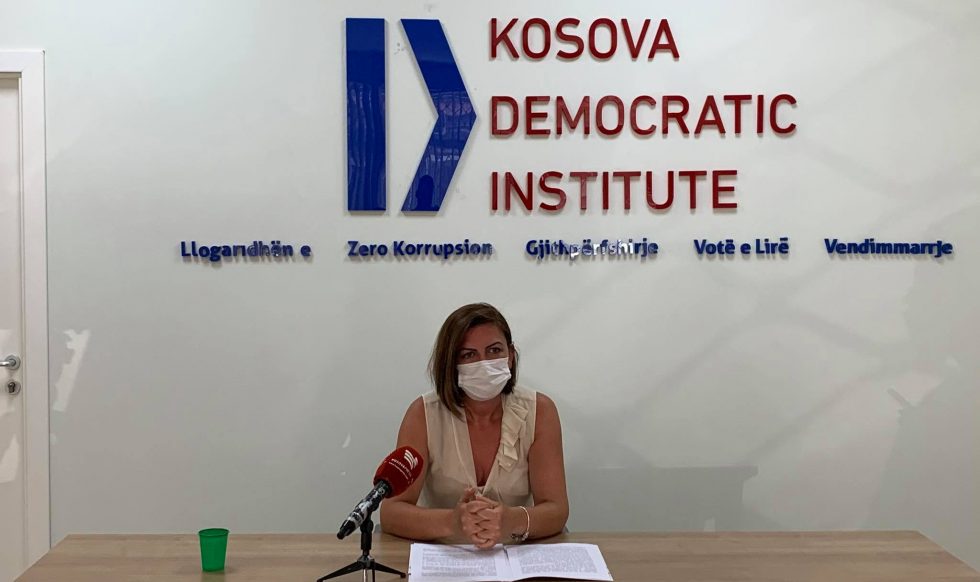


Kosova Democratic Institute (KDI) and partner Non-Government Organisations YAHR, ISDY, “Syri i Visionit” and “Ekovisioni” in the framework of USAID Transparent, Effective and Accountable Municipalities activity, through a press conference, disclosed challenges causing non-implementation of National Audit Office’s recommendations in the following six municipalities: Prizren, Suhareka, Ferizaj, Lipjan, Podujeva and Istog.
Referring to General Auditor’s report on these six municipalities for the period 2015-2018, the NGO coalition found that there are around 33 issues related to financial management repeating year after year. The main highlighted issues are those related to planning and management of own-source revenues, financial reporting, property management issues, payments via enforcement agents, which ultimately are presented as miss-classification of expenditures in financial reports/statements, and employment under special service agreements in municipalities.
It is worth highlighting the decline in auditor’s findings related to public procurement procedures, whereby the contract management remains a systematic problem in this governance activity.
In order to identify causers for the systematic recurrence of such findings, the NGO coalition, in cooperation with representatives from the Municipalities of Prizren, Suhareka, Ferizaj, Lipjan, Podujeva and Istog, has performed a joint root cause analysis. According to analysis, the common causes of a low implementation level of the General Auditor’s recommendations are as follows:
1. Lack of complete property evidences (including proper categorisation at the cadastral registry), and illegally occupied properties, which have a direct impact in municipal revenues, financial reports and property management in municipalities. Adding to the problem, there are limited human resources for carrying out physical verification of all properties in the municipality.
2. Poor planning of own-source revenues.
3. Updating of the Law on Local Self-Governance and other central level laws, along with central level agreements (such as collective agreements). The concern related to non-harmonisation of laws was raised in the annual performance report of the National Audit Office of 20 April 2020;
4. Lack of centralized municipal documentation management systems, which resulted in delays for processing invoices received by municipalities;
5. Delays of the Procurement Review Body in addressing cases, resulting in delays of capital investment budget implementation;
6. Lack of legal provisions for addressing in details the abnormally low-prices, affecting public contracts implementation, such as cost analysis and market analysis, rather than just relying on a confirmation by the Economic Operator stating that it can implement the contract based on the bid prices;
7. Frequent managerial staff turnover, lack of human resources, directly affecting each of the repeated issues in the analysed municipalities.
The NGO coalition for monitoring public procurement, calls on central government and municipalities to focus on improvement of public finances management by fulfilling the following recommendations:
1. Municipalities should draft implementable plans, in compliance with their capacities, to complete verification of properties and update cadastre registry;
2. Mayor of the Municipality should focus on establishing good governance systems and enhancing accountability and liability measures for Heads of relevant Departments and Units;
3. Ministry of Local Governance Administration should engage in updating the Law on Local Self-Governance in accordance with the central-level laws that regulate nation-wide activities;
4. Ministry of Local Government should help municipalities draft internal regulations and work plans for planning, monitoring and reporting activities, as well as documentation control tools.
5. Ministry of Finances, in accordance with the Law No. 03/L-040, Article 18, 3, should review collective contracts and make proper budgetary appropriations to municipalities in order to avoid payment delays, enforcement fines and misclassification of municipal expenditures;
6. The Procurement Review Body should update regulations on the right of complaint, time limits and final decisions, so as to avoid problems with delays in capital investments and municipal budget implementation;
7. The Public Procurement Regulatory Commission should update rules and guidelines regarding assessment and evidences on abnormally low prices;
This analysis was developed by KDI, ISDY, YAHR, “Syri i Vizionit” and “Ekovizioni” via a grant issued by USAID Transparent, Effective and Accountable Municipalities (USAID TEAM) activity.